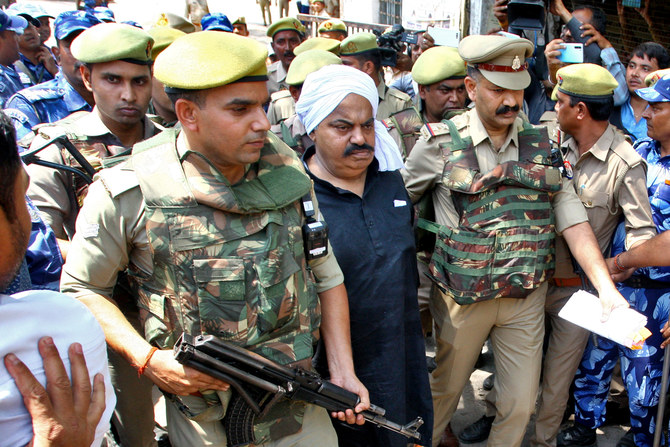NEW DELHI: A former Indian lawmaker convicted of kidnapping was shot dead, along with his brother, while being escorted by police in northern India on Saturday.
Atiq Ahmed and his brother, Ashraf Ahmed, were under police escort for a medical check-up at a hospital on Saturday night when three men shot them from close range as they were speaking to reporters in Prayagraj city in Uttar Pradesh state.
Multiple videos of the shooting were shared widely across social media after it was initially broadcast live on local TV channels. The footage shows the brothers in handcuffs before a man pulled a gun close to Atiq’s head, with Ashraf also shot a split second later.
“According to the initial information, three people came in the guise of media persons and they tried to take (sound) bites,” Prayagraj Police Commissioner Ramit Sharma told reporters on Saturday.
“At that time they fired, and we have arrested three people, and Atiq and Ashraf died.”
The government of Uttar Pradesh, controlled by Prime Minister Narendra Modi’s ruling Bharatiya Janata Party, formed a three-member judicial commission on Sunday to investigate the killings and submit a report in two months.
“Today there is a complete shutdown in Prayagraj and people are in a deep sense of fear,” social activist Irshad Ullah, who is based in the city, told Arab News.
Internet services and gatherings of more than four people were barred across the state after the attack.
“No one is safe now. If the state does not like you it can kill you at will — this is the message from this incident.”
Atiq Ahmed, 60, had a long stint both in politics and in the criminal world. He was a state lawmaker four times and had dozens of cases, including kidnapping, murder, and extortion, registered against him over the past two decades.
Ahmed had petitioned the Indian Supreme Court for protection two weeks earlier, saying there was a threat to his life from the police. His teenage son was shot dead by police on Thursday in what was described as a shootout.
“Crime has reached its peak in UP (Uttar Pradesh) and the morale of the criminals is high. When someone can be killed openly despite being surrounded by a security cordon, one can imagine the state of the general public. Due to this, an ambience of fear is being created among the public,” Akhilesh Yadav, chief of the opposition Samajwadi Party, said in a tweet.
Rakesh Tripathi, BJP spokesperson in Uttar Pradesh, said an investigation was underway.
“The incident in Prayagraj is unfortunate and police are investigating the matter. The accused are in police custody and we are investigating the whole affair,” Tripathi told Arab News.
Saturday’s killings have sparked concerns over India’s rule of law among human rights activists and members of civil society.
“Over a dozen bullets fired to kill gangster Atiq Ahmed and his brother in the presence of the police and camera persons without any retaliatory fire from the police personnel present points to the worrying truth that justice by the judiciary has been done away with,” Suhas Chakma, director of Delhi-based Rights & Risks Analysis Group, told Arab News.
“How the police can be so lax knowing well that he was a high-profile convict? How can some three people come and kill him despite such a huge police presence?” Prof. Roop Rekha Verma, social activist and former professor at Uttar Pradesh’s Lucknow University, told Arab News.
“My question is on the intention of the police and the government,” she added.
The killings, according to senior Supreme Court advocate Sanjay Hedge, are “a total negation of the rule of law.
“The judiciary cannot look away or be seen as complicit in a cover-up. It must take a more proactive stance, asking the right questions and eliciting answers,” Hedge told Arab News.
Delhi-based political analyst Prof. Apoorvanand Jha, said the incident was a challenge for Indian democracy.
“This is an ominous sign for Indian democracy,” Jha told Arab News. “Atiq Ahmed approached the supreme court for protection. So now we will wait to see whether the apex court takes the suo moto cognizance of these killings and makes the Uttar Pradesh government accountable.”

























